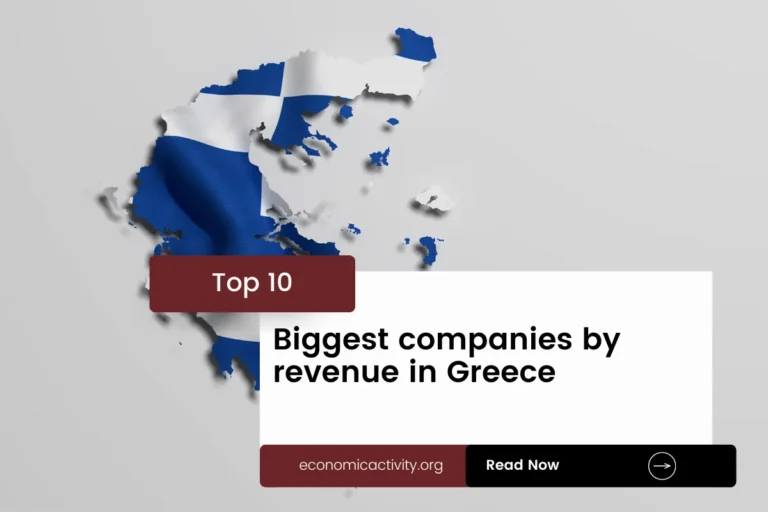Greece, with a population of 10,426,919, is ranked 87th in the world, just behind Honduras. Located in southeastern Europe, it covers a total area of 131,960 square kilometers, ranking 93rd globally, just below Tajikistan.
Greece’s economic position in 2022 showcases a GDP of $217.58 billion, ranking 53rd globally, trailing behind Kazakhstan with a GDP of $225.50 billion. The GDP per capita for Greece stands at $20,867.27, placing it 48th in the world, falling short of Latvia with a GDP per capita of $21,779.50.
Despite facing challenges, Greece continues to navigate its economic landscape with resilience, seeking avenues for growth and stability in the global market.
What are the economic activities of Greece?
- Primary activities: 4.1% of GDP.
- Secondary activities: 16.9% of GDP.
- Tertiary activities: 79.1% of GDP.

Primary Sector of Greece
Greece’s primary sector, particularly agriculture, thrives due to its diverse climate and abundant natural resources. With 45.52% of the country’s land dedicated to agriculture, Greece produces a variety of crops and animal products. The main agricultural products include maize, wheat, sheep milk, peaches/nectarines, oranges, grapes, tomatoes, milk, watermelons, and potatoes.
Despite agriculture contributing 4.1% to the GDP, these products play a crucial role in the country’s economy. The sector’s significance lies in the variety and quality of its produce, highlighting the importance of agriculture in Greece.
With a diverse geological landscape, the primary sector thrives on abundant natural resources like lignite, petroleum, iron ore, bauxite, and more. These resources fuel the economy and boost industries, especially mining and energy production, making a significant impact on the country’s economic growth.
Despite its relatively low oil production levels, Greece plays a minor role in the global oil market, ranking 65th worldwide. With reserves of 10 million barrels, the country contributes minimally to the world’s oil supply, holding just 0.1% of global reserves.
Greece’s natural gas production in 2020 reached 4 million m³, securing its position as the 98th largest producer globally. This production plays a crucial role in the country’s energy sector, contributing to its economic activity and overall growth.
Secondary Sector of Greece
What is the secondary sector or what are secondary activities?
The secondary sector involves industries that create finished products ready for consumption. They take raw materials from primary activities and manufacture new goods for domestic sale or export. In Greece, the main industrial products include food and tobacco processing, textiles, chemicals, metal products, and petroleum.
Manufactures in Greece’s total exports are not as significant, accounting for only 36.25% in 2023. Other sectors may play a more crucial role in driving the country’s export economy.
Tertiary sector of Greece
What is the tertiary sector or what are tertiary activities?
The tertiary sector in Greece encompasses a wide range of services where individuals provide knowledge and expertise to enhance productivity and meet various needs. This sector includes intangible goods such as advice, attention, and expertise, catering to both consumers and businesses. Some of the main tertiary activities in Greece are restaurants, healthcare and medical care, education and training, banking and finance, communication and information exchange, media production and distribution, and tourism and hospitality.
Specifically, Greece’s economy heavily relies on tourism, contributing significantly to its GDP. With an impressive 34,005,000 annual arrivals, outnumbering its population by 3.2613 times, popular destinations like the Acropolis in Athens and the idyllic Santorini island attract countless visitors, fueling the nation’s prosperity.
Another example of tertiary economic activity is the mobile cellular sector, with over 11 million subscriptions, supporting technological growth by enhancing connectivity, fostering innovation, and facilitating digital services across industries.
Military Activities and Economic Sectors of Greece
The military is a great example of many economic activities working together. In Greece, the primary sector helps by providing resources for military use, like metals for weapons. The secondary sector is important too, as it manufactures military equipment. The tertiary sector offers services, while the quaternary sector focuses on military research and development. Lastly, the quinary sector involves high-level decision making and strategy in the military.
In 2023, Greece’s military expenditure was about $7.73 billion, which is 3.69% of its GDP. The active military force consists of 142,700 personnel, giving a ratio of 34.2 active military members per 1,000 people in the country.
Biggest company in Greece
Which is the biggest company in Greece? The largest company is Eurobank Ergasias, with a market value of $4.28 billion. It operates in the banking industry, which is part of the tertiary economic sector. Eurobank was founded in 1990, providing various financial services.
International Trade of Greece
Import Activities of Greece

Greece’s high import activities, accounting for 58.86% of GDP, are crucial for meeting domestic demand and fueling economic growth.
Greece’s import activities are diverse, with key partners like China, Germany, Russia, Italy, and Iraq. Main imports include crude petroleum, natural gas, refined petroleum, garments, and packaged medicine.
Exports Activities of Greece

Export activities in Greece are highly important, accounting for 49.14% of GDP in 2023. Total exports reached $55.05 billion, signifying a vital economic driver for the country.
Greece’s export activities are diverse, with key partners including Italy, Bulgaria, Germany, Cyprus, and Turkey. Major export commodities include refined petroleum, packaged medicine, aluminum, natural gas, and plastic products.
Greece economy challenges in 2024
Greece, despite its developed economy, faces challenges in 2024. High public debt persists, alongside negative household savings and high unemployment rates. Corruption and competitiveness gaps pose additional hurdles despite post-COVID growth.




Leave a Reply